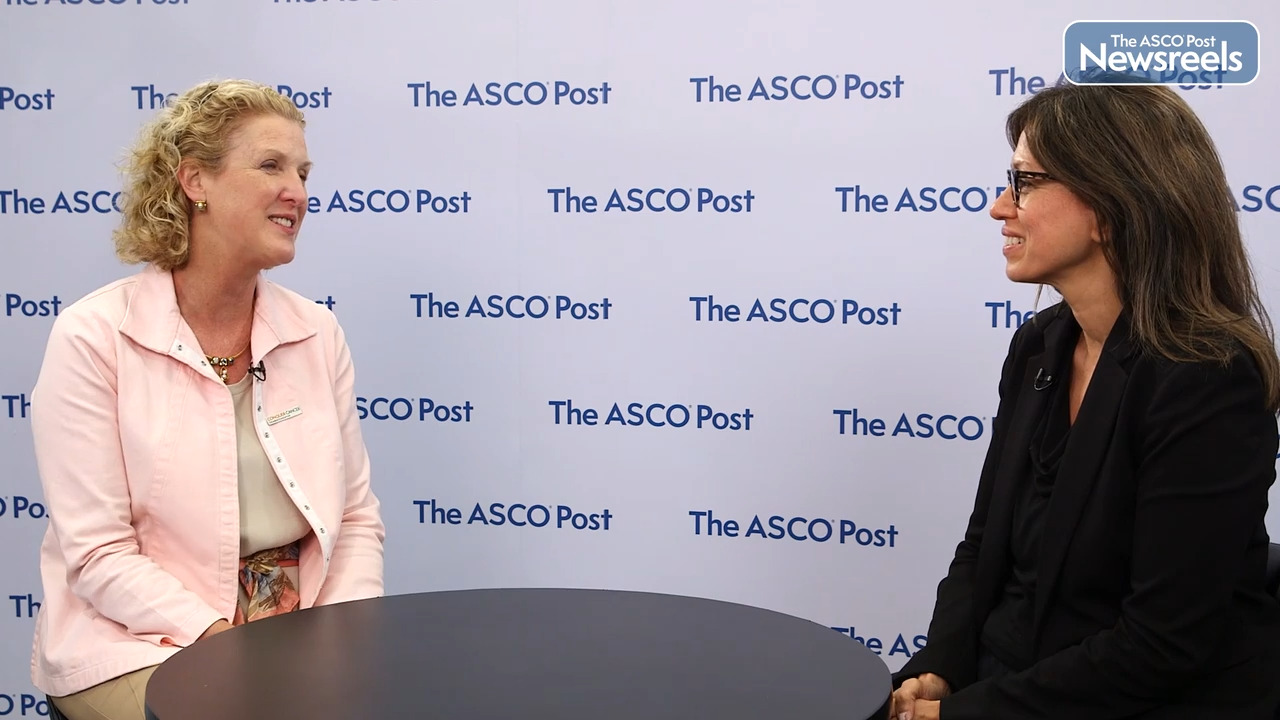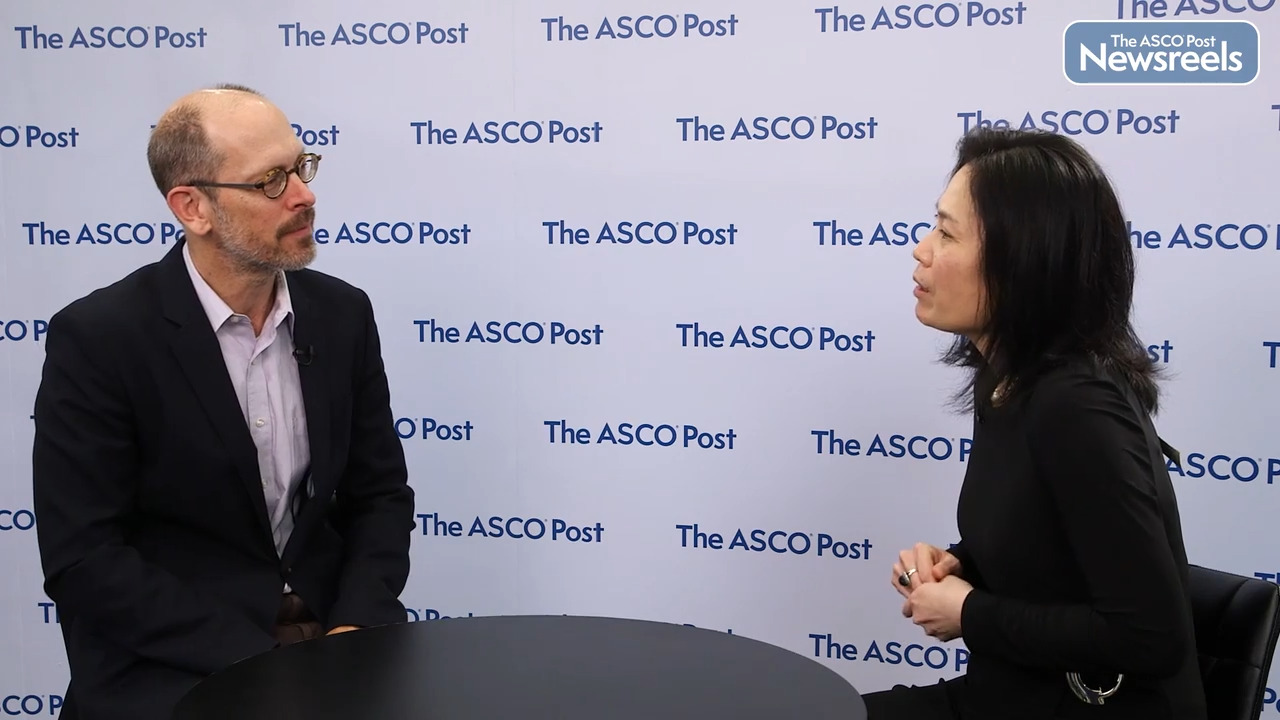Alfredo Carrato, MD, PhD, on Pancreatic Cancer: Nab-Paclitaxel, Gemcitabine, and FOLFOX for Metastatic Disease
2022 ASCO Annual Meeting
Alfredo Carrato, MD, PhD, of Alcala de Henares University in Spain, discusses phase II results from the SEQUENCE trial, which showed that nab-paclitaxel, gemcitabine, and modified FOLFOX showed significantly higher clinical activity than the standard nab-paclitaxel and gemcitabine in the first-line setting of patients with untreated metastatic pancreatic ductal adenocarcinoma (Abstract 4022).
Transcript
Disclaimer: This video transcript has not been proofread or edited and may contain errors.
It's a pleasure for me to show the results of the SEQUENCE trial. The SEQUENCE trial was a randomized phase two trial in pancreatic cancer patients, metastatic ones on first line and we tried to increase the efficacy of the regimens used for treating these patients. So the rational that there were two subtypes of pancreatic cancer, the basal one responded better to Nab-Paclitaxel Gemcitabine and the classical one better to FOLFIRINOX. So as it was impossible to give both regimens at the same time for toxicity issues, we decided to give them sequentially first Nab-Paclitaxel Gemcitabine, and then not FOLFIRINOX, FOLFOX because we thought that the oxaliplatin was the main drug of the combination. And on top of that, we had that Nab-Paclitaxel was given up front and it was depleting this trauma and allowing the drugs to get in touch more efficiently with the tumor cells. So we performed a phase I trial, and we were surprised because we were expecting some neurological toxicity, but no neurologic toxicity appeared and it was safe at full doses and it was published at the European General Cancer two years ago. Then we designed this randomized phase two trial, trying to increase 50% the survival of patients at one year. It was from 35% to 50%, more or less. So with these things in mind, we designed a trial in which 78 patients per arm were needed and the safety results showed that neutropenia and thrombocytopenia were higher in the experimental arm, significantly higher, 47% and 26% and the efficacy at 12 months hypothesis was met. We found that 55.5% of patients were alive at one year in the experimental arm and only 35% in the control arm, which was Nab-Paclitaxel and gem without FOLFOX. So we looked for other efficacy parameters, like time to progression free survival, overall survival, and all of them were positive. In favor of the experimental arm. We reached a median overall survival of 13.2 months versus 9.5 months in the control arm. The hazard ratio was lower to 0.65 and this was real good surprise because we have discovered a new treatment option for our patients and pancreatic cancer patients have few good news. In the last 20 years, just two trials demonstrated an increase in efficacy rates. One of them was the Nab-Paclitaxel Gemcitabine and now against this regimen, we have demonstrated a superiority in efficacy. So we are happy about that and because our patients will live longer and have another option for treatment. This is only for a core zero and one patients, it's only for well fit patients, not for performance status, middle, core two, or very old patients but when you have these patients, this regimen provides excellent results.
Related Videos
The ASCO Post Staff
Lisa A. Carey, MD, of the University of North Carolina Lineberger Comprehensive Cancer Center, and Shanu Modi, MD, of Memorial Sloan Kettering Cancer Center, discuss the phase III findings from the DESTINY-Breast04 trial, which compared fam-trastuzumab deruxtecan-nxki (T-DXd) vs treatment of physician’s choice (TPC) in patients with HER2-low unresectable and/or metastatic breast cancer. T-DXd is the first HER2-targeted therapy to demonstrate clinically meaningful improvement in progression-free and overall survival compared with TPC in this patient population, regardless of hormone receptor or immunohistochemistry status or prior use of CDK4/6 inhibitors (Abstract LBA3).
The ASCO Post Staff
Michael J. Overman, MD, of The University of Texas MD Anderson Cancer Center, and Smitha Krishnamurthi, MD, of the Cleveland Clinic, review three abstracts, all of which enrolled patients with newly diagnosed RAS and BRAF wild-type metastatic colorectal cancer with left-sided primary tumors. The discussion centers on what the study results indicate about the use of an EGFR therapy and weighing the risk to quality of life from rash, in particular (Abstracts LBA3503, LBA3504, LBA3505).
The ASCO Post Staff
Sue S. Yom, MD, PhD, of the University of California, San Francisco, discusses a translational analysis from the NRG-HN002 study. This phase II trial established the feasibility of the tumor tissue–modified viral (TTMV) human papillomavirus DNA assay in clinical trial specimens. The goal is to use such an assay to measure tumor volume, levels of TTMV over the course of treatment, and the association of TTMV to treatment outcomes (Abstract 6006).
The ASCO Post Staff
Michael J. Overman, MD, of The University of Texas MD Anderson Cancer Center, and Jeanne Tie, MBChB, MD, of Peter MacCallum Cancer Centre, discuss results from the DYNAMIC trial, in which a circulating tumor DNA (ctDNA)-guided approach reduced the use of adjuvant chemotherapy without compromising recurrence-free survival in patients with stage II colon cancer (Abstract LBA100).
The ASCO Post Staff
Stephen M. Ansell, PhD, MD, of Mayo Clinic, discusses updated data from the ECHELON-1 trial, which showed that, when administered to patients with stage III or IV classical Hodgkin lymphoma, the combination of brentuximab vedotin, doxorubicin, vinblastine, and dacarbazine (A+AVD) vs doxorubicin, bleomycin, vinblastine, and dacarbazine resulted in a 41% reduction in the risk of death. These outcomes, says Dr. Ansell, confirm A+AVD as a preferred option for previously untreated disease (Abstract 7503).





